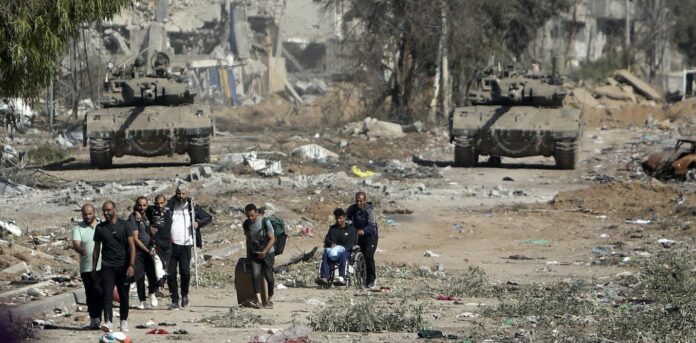Israel’s ground offensive in Gaza City is ignoring the past lessons of urban warfare
By James Horncastle, Simon Fraser University
Mediators are seeking to extend the truce between Israel and Hamas beyond Wednesday amid the exchange of hostages for prisoners. But Israeli Prime Minister Benjamin Netanyahu has vowed to resume the war with “full force” when the truce ends.
Hamas’s terrorist attack on Oct. 7 and Israel’s subsequent aerial bombardment and direct ground operation in Gaza on Oct. 27 have polarized world debate. This has led to a dearth of critical analysis on the conflict. One area where this has been poignantly clear is the lack of attention paid to the tactical problems that Israel’s incursion in Gaza faces.
The challenges of urban warfare
Urban warfare is not a new phenomenon. The Iliad, for example, deals with the problems an army encounters in attacking a fortified city. Although much has changed with regards to urban warfare since the Late Bronze Age, one factor has not: urban warfare favours the defender.
In any military campaign, knowledge of the terrain is of paramount significance. This fact of military operations is even more important in battles against guerrilla forces.
Israel magnified the problem of the urban environment in the immediate aftermath of the Oct. 7 attacks. Since that time, Israel has conducted an extensive bombing campaign of the Gaza Strip.
Counterintuitively, massive bombardment of urban areas can actually work to a defender’s advantage. International attention, rightfully, is on the number of civilians killed in the bombing campaign. While bombs can be guided with increased confidence that they will hit their target, the destruction that they will create is more uncertain. At least a third of the buildings in Gaza City, if not more, have either been destroyed or damaged.
The debris created by artillery and bombing campaigns aids the defender in two ways. First, debris creates natural choke points and fortifications that the defender can use to control the movement of the aggressor. It can even be to a defender’s advantage to intentionally destroy buildings to help funnel attacking forces.
Second, the defender has much more intimate knowledge of their own city. Unlike an aggressor, which must rely on outside knowledge, the defender knows the city in ways that can only come from firsthand knowledge. The defender, therefore, will know how to bypass the destruction and roadblocks in ways that are impossible for the aggressor.
Gaza City is not a standard city
The above issues would be a factor in any urban warfare campaign. Gaza City, however, is not a standard urban environment. Hamas has, in fact, prepared the city for precisely the type of operation Israel is now conducting.
The major issue the Israeli military will face in attacking Gaza City is the extensive tunnel network. According to Hamas, the tunnel network is over 500 kilometers in length. Israel claims the tunnels are so extensive that they even extend into the al-Shifa hospital in their attempt to justify their decision to raid it as a viable military target.
The tunnels serve two purposes. First, they enable large segments of Hamas to wait out the bombing campaign. Israel has made the elimination of the tunnels a top priority, using specially designed munitions, ground forces and robots to map and destroy the tunnels. The scale of the tunnels makes such a task, however, difficult, if not impossible.
Second the tunnels will allow Hamas to deploy its forces in ways that are impossible for the Israeli military. The extensive nature of the tunnels, and the resulting ability of Hamas to move troops and equipment through them, has caused the Israeli military to refer to it as the “Gaza Metro.” Much like a metro line, it allows one to bypass clogged streets, in this case caused by the Israeli bombardment, and redeploy elsewhere.
The call to reserves
Israel’s military does possess some highly capable units. Israel’s air force and special forces, for example, are amongst the most professional and capable in the world. This capability, however, does not extend to the bulk of the Israeli army.
Urban warfare, by its nature, requires a high degree of co-ordination and discipline by the soldiers conducting such operations. This is not the current nature of the Israeli army, at least as constituted for its campaign against the Gaza Strip. Israel, to conduct the operation, had to bolster its army by recalling 360,000 reservists for active duty.
While many of the reservists were enthusiastic in their response to the call-up, enthusiasm does not equate with discipline and the ability to co-ordinate with other branches and units.
Problems created by ill-discipline and underpreparedness is exactly what Hamas seeks from Israel at this juncture. Hamas’s leaders wanted to bring the Palestinian cause to the forefront of international attention. Actions undertaken by ill-disciplined and undertrained troops will only keep Palestine at the forefront of international attention.
The temporary ceasefire, while hopeful in that it shows negotiation is possible between both sides, does not dramatically alter the urban environment. While Israel may replenish the supplies that it expended in the initial bombardment and attack, this does not appreciably change the above constrictions. In fact, it may, for the reasons outlined above, magnify the problems. Given Gaza City’s urban density it will be the civilian population, more than Hamas, that suffers.![]()
James Horncastle, Assistant Professor and Edward and Emily McWhinney Professor in International Relations, Simon Fraser University
This article is republished from The Conversation under a Creative Commons license. Read the original article.



